
History of Pirate Surgeons Menu: 1 2 3 4 5 6 7 8 9 10 11 12 Next>>
The History of Sea and Pirate Surgeons, Page 10
Pirate Surgeon Robert Bradinham (William Kidd)
Surgeon Robert Bradinham is perhaps most famous for being one of the two witnesses to testify against Captain William Kidd at trial, the other being Joseph Palmer. For this, he was pardoned of the charge of piracy. Bradinham sailed with Kidd on the Adventure Galley from England in May of 1696, signing on to the ship when it started out as a legitimate privateering voyage.
Particularly interesting from a surgical point-of-view is his involvement in and testimony about Kidd killing sailor William Moore with an iron-bound bucket.
A Fanciful Illustration of Kidd Killing Moore with a Bucket,
Showing Kidd With a Beard For Some Reason. (19th c.)
Moore was arguing with Kidd that they should have taken a Dutch ship when Kidd hit him with the bucket. Palmer testified that he saw Kidd hit Moore. On reaching Moore, "I felt on his Head, and I felt something give way, and about the Wound there was a Bruise."1 Palmer also states that the wound didn't result in much bleeding, which would not have been unusual for a head wound. Surgeon Bradinham testified that he "was sent for to his Assistance after he [Moore] was wounded, and I came to him, and asked him how he did; he said, He was a dead Man, Captain Kidd had given him his last Blow."2
Like much of Kidd's trial, the truth of what actually happened is not entirely clear. For example, Richard Barlicorn stated, "William Moore lay sick a great while before this blow was given; and the doctor [Bradinham] said, when he visited him, this blow was not the cause of his death."3 Doctor Bradinham immediately refuted this, but Barlicorn reasserted, "He [Moore] was sick some time before, and this Blow did but just touch him; and the Doctor said, He did not die on the occasion of this Blow."4 Palmer agreed with Bradinham, testifying that Moore "was in perfect health before [being hit with the bucket]"5 but that he died the day after being hit. Barlicorn said that he thought Moore lived about a Week, but when pressed admitted "I cannot tell justly how long it was."6
Upon Moore's death, Palmer said "the Surgeon [Bradinham] was called to open his Head, and Captain Kidd said, You are damn'd busie without Order."7 This suggests enmity between Kidd and surgeon Bradinham long before the trial, although since it comes from the one other witness against Kidd, its veracity could be questioned. Bradinham testified that "The Wound was but small, the Scull was fractured."8 and Moore died as a result of it.
Kidd said a great deal intending to undermine Bradinham's honesty and his testimony. Kidd repeatedly points out that Bradinham was lying and that his testimony contradicted itself. For example, they had the following exchange regarding the surgeon's chest:
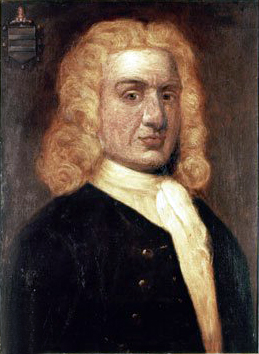
Captain William Kidd
Will. Kid. Did not you come aboard my Ship, and rob the Surgeon's Chest?
R. Bradinham. No, I did not.
Will. Kid. Did not I come to you, when you were away, and met you on the Deck and said. Why do you take the Chest away? R. Bradinham. No, I did not do it.
Will. Kid. You are a Rogue.9
This exchange was in reference to Kidd's assertion that that the majority of the crew - including Bradinham - abandoned him and joined pirate captain Robert Culliford's ship Mocha when they met them off the coast of Africa. Kidd says, "the said Deserters, sometimes in great numbers, came on board the said [Adventure] Gally and Adventure Prize [the Quedah Merchant] and carried away great guns, Powder, Shot, Small Armes, Sailes, Anchors, Cables, Chirurgeons Chest, and what else they pleased"10. Bradinham must have indeed left Kidd; he later appears to have boarded Giles Shelley's ship (where he is identified in the document as 'Doctor ---- Badawain') out of Culliford's so that he could sail with Shelley back to New York.11
Kidd also told one of the examiners that Bradinham's testimony about the taking of two 'Moorish' ships was worthless because "he knows no more of these Things than you do. This Fellow used to sleep 5 or 6 Months together in the Hold."12 When he later accuses Bradinham directly of not being on deck very often, he softens his comment a bit by asking, "How came you to keep this account, when for five or six months together you were under Deck?"13 It is entirely possible Bradinham spent most of his time below deck since that's where his quarters and surgery would have been. Richard Barlicorn noted in his testimony that "we had several sick men on board"14, who would have been under Bradinham's charge below deck.
Bradinham may have been an alcoholic. This is the accusation of modern author Richard Zacks, who rarely misses a chance to paint Bradinham as a drunkard in his book15. Unfortunately, Zacks' book is hard to take seriously as historically-based fact due to his tendency to add narrative not found in the period material along with an overtly-stated bias in defense of Kidd. Several of Zacks' comments are hamfisted and unsubstantiated by the period accounts, such as: "[Kidd] ordered Dr. Bradinham to sober up and tend to the man"16 and "Bradinham was forced to put down his glass and come on deck."17 However, other comments about Bradinham in Zacks' book appear to draw from period sources. For example, 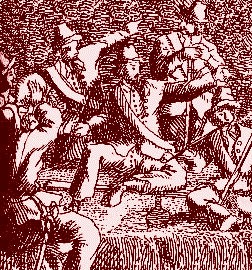
Pirates Drinking, From Histoire der Engelsche
zee-roovers (1725)
Zacks comments that "Kidd later said that Bradinham spent months at a time drunk below deck"18. Zacks also quotes Bradinham himself as saying "[Captain] Shelley sold liquors out the said shed... and I often went there to drink."19 Unfortunately, he doesn't footnote these apparent quotes making it difficult to substantiate the period document sources.
Kidd's comment at trial that Bradinham spent months below deck asleep may refer to the man being in a drunken stupor, although this isn't actually stated. (Zacks clearly interprets it this way.) In addition, Kidd introduced a Mr. Say during the trial who appears to have been drinking with a Mr. Elbury and surgeon Bradinham, although even this is not conclusive from the text.20
Kidd seems to have been guilty of piracy based on the amount of treasure he brought back and hid. (If his men had mutinied against him, it seems likely would have taken all this treasure when they abandoned him in favor of Culliford.) Yet reading the trial gives a sense that Kidd was railroaded by the court.
Editor Joel Baer comments in his introduction to the trial that "Kidd and his men were at a great disadvantage. Not only were they forced to defend themselves without counsel, except on matters of law, but they were also denied the right to give evidence under oath."22 He further points out that it there was no political advantage to those who had supported or opposed Kidd when the trial occurred, so "the machinery was put in motion to assure his conviction and spread a thick coat of whitewash over King and ministry."22 To do this, Admiralty law required that they have at least two witnesses - in this case Palmer and Bradinham - so it is entirely plausible that their testimony was pre-planned to convict Kidd.
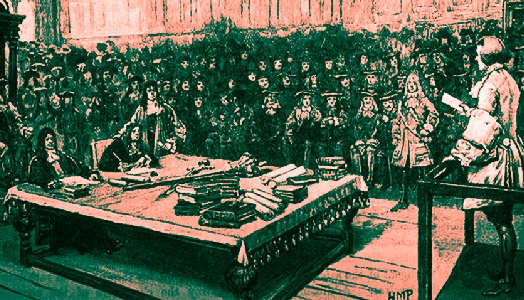
Kidd's Trial, From Cassell's History of England, Vol. III (1905)
Interestingly, Bradinham admits that he had a share of the plunder.23 When asked why such a reprobate as Bradinham was given a share of the plunder, you can almost hear Kidd shrug as he says, "Because he was the Surgeon."24 Accepting part of the plunder would normally have weighed heavily against acquittal. However, the government needed two clean witnesses to make their case, one of which was clearly Bradinham. As Kidd himself bitterly (and likely not unjustly) asks, "Mr. Bradinham, are not you promised your Life, to take away mine?"25
It must also be remembered that this began as a legitimate privateering voyage and the surgeon would have had a share just as any other man. (In many ships, he would had more than one.) In the end, however, Bradinham's share was confiscated. It consisted of "624 pieces of Arabian and Christian gold, which makes about 414l. [pounds]" which he died before receiving.26 Whatever else can be said of the man, Robert Bradinham hardly seems like the ideal sea surgeon. In a letter to the Lords of Trade, Richard Coote, the Earl of Bellomont, who was one of the original sponsors of Kidd's privateering voyage, said, "Robert Bradenham that was Kidd's Surgeon is the obstinatest and most hard'ned of them all."27
1 The Arraignment, Tryal and Condemnation of Captain William Kidd for Murther and Piracy, 1701, p. 8; 2 The Arraignment, Tryal and Condemnation..., p. 9; 3,4 The Arraignment, Tryal and Condemnation..., p. 11; 5,6 The Arraignment, Tryal and Condemnation..., p. 8;7 The Arraignment, Tryal and Condemnation..., p. 11; 8 The Arraignment, Tryal and Condemnation of..., p. 9; 9 The Arraignment, Tryal and Condemnation..., p. 41; 10 William Kidd, "76. Narrative of William Kidd, July 7, 1699", Privateering and Piracy in the Colonial Period - Illustrative Documents, 192 (reprint), p. 185; 11 "73. Examination of Edward Buckmaster. June 6, 1699", Privateering and Piracy in the Colonial Period - Illustrative Documents, 1923 (reprint), p. 177-8; 12 The Arraignment, Tryal and Condemnation..., p. 42; 13 The Arraignment, Tryal and Condemnation..., p. 11; 14 The Arraignment, Tryal and Condemnation..., p. 54; 15 See Richard Zacks, The Pirate Hunter, 2002, p. 115, 120, 149; 152, 288, 290, 344; 16 Zacks, p. 120; 17 Zacks, p. 149; 18 Zacks, p. 282; 19 Zacks, p. 288; 20 The Arraignment, Tryal and Condemnation of Captain William Kidd, p. 31; 21 Joel Baer, "The Arraignment, Tryal, and Comdemanation...", British Piracy in he Golden Age, Vol. 2, 2007, p. 145; 22 Baer, p. 145; 23 See for example, The Arraignment, Tryal and Condemnation..., p. 21; 24 The Arraignment, Tryal and Condemnation..., p. 42; 25 The Arraignment, Tryal and Condemnation..., p. 48; 26 "December 31 Philidelphia", Calendar of State Papers Colonial, America and West Indies: Volume 18, 1700, Retrieved from the British History Online Website, 4/23/17; 27 Richard Coote, "Earl of Bellomont to the Lords of Trade", Documents relative to the Colonial History of the State of New York, Vol. IV, 1854, p. 646
Pirate Surgeon John Hincher/Kencate (Edward Low)
Edward Low's primary surgeon appears to have been identified by two different names: John Kencate and John Hincher. The original trial document, published as Tryals of Thirty Six Persons for PIRACY in 1723, identifies "John Kencate, Doctor"1 who was present "At a Court of Admiralty for the Tryal of Pirates held at the Town-House in Newport in the Colony of Rhode-Island and Providence-Plantations, the Tenth Day of July, In the Ninth Year of His Majesties Reign. Annoq; Domini 1723."2 The name John Hincher appears nowhere in this document.
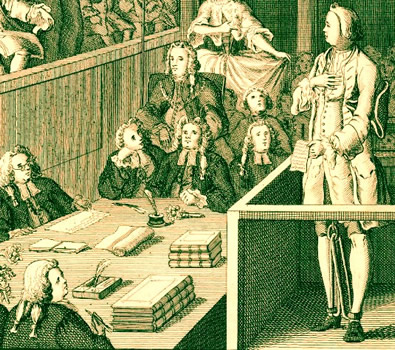
The Gentleman Highwayman at the Bar, From a Broadside, British Museum
Collection, Cropped and Recolored (1750)
A listing of the men tried found in Charles Johnson's book The General History of the Pirates identifies "John Hincher, Doctor, 22 (years old), (born) Near Edinburgh, Doctor Scot."3 who appeared at "a Court of Vice Admiralty ...for their Tryals, which begun on the 10th of July, at Newport [Rhode Island]"4. No one named Kencate appears in Johnson's entry on Low. A Newspaper report of the capture of Low's pirates states, "The Names of the Pyrates in the Sloop, call’d the Ranger, taken by his Majesty’s Ship the Greyhound, who are confin’d in the Prison at Rhode Island; are as follows …John Hinchbard Surgeon, near Edinburgh."5 With the exception of the mispelling of the last name, this corresponds well with Johnson's account. Since several parts of Johnson's book have been sourced to newspaper accounts by modern historians6, this is likely the origin of this information.
It is clear that both sources are referring to the same trial, however, so it Kencate and Hincher appear to be the same person. Since the trial is an official document and newspaper accounts often contain errors, 'John Kencate' seems more likely to be the correct name of this surgeon.
At trial, Kencate said that he had formerly been "Chirurgeon of the Sycamore Galley, Andrew Scot Master, and was taken out of the said Ship in September last [1722] at Bonavista, one of the Cape De Verde Islands by Low and Company"7. Historian Eric Graham identifies him as "a fine catch as he was a recent graduate of Edinburgh University"8. Although much of what is known about Kencate's time among the pirates was presented in the previous sections, it is worth gathering and expanding upon them here to provide a full picture of this interesting pirate surgeon.
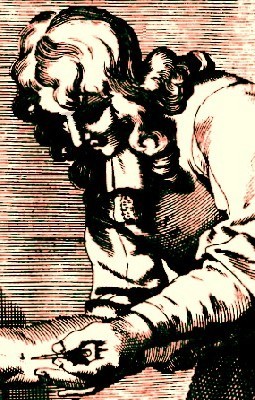
Surgeon with a Fleam, From Armamentarum
Chirurgiae
Appendix, By Johannes Scultetus,
p. 188 (1671)
Kencate said he neither signed the pirates articles nor shared any of their plunder. As mentioned elsewhere in this article, these were important points in the defense of a man accused of piracy. In spite of this, the Advocate General at the trial actually went out of his way to cast suspicion on Kencate, explaining that
altho' it may be said, [illegible - probably 'he was'] not Harness'd (as they term it [referring to his being armed]) but was a forc'd Man; yet if he receiv'd part of the Plunder, was not under a constant durance, did at any time approve, or join'd in their Villanies, his Guilt is at least equal to the rest; The Doctor being ador'd among 'em as the Pirates God far in him they chiefly confide far their Cure and Life, and in this Trust and Dependance it is, that they Enterprize these Horrid depredations not to be heightened by aggravation, or Lessened by any Excuse.9
However, Kencate's claim was confirmed by deponents John Wilson, Henry Barns and Thomas Jones. They all swore "that the Prisoner at the Bar was forced on Board by Low, and that he never signed Articles as they knew or heard, but used to spend great part of this Time in reading, and was very courteous to the Prisoners taken by Low and Company, and that he never shared with them, as they knew or heard of."10
There are several mentions of an unnamed doctor/surgeon in Low's crew in some of the period documents, which most likely refer to Kencate. These paint an interesting picture of the man's surgical career among the pirates. When Captain John Welland "had his right Ear cut off, and was wounded very much with a Cutlass, and turn'd down the Hatches [sent below], where he lay bleeding for two or three Hours with a Centinel over him... Patrick Cunningham got him some Water; then he ...went and brought the Doctor to him, and help'd the Doctor dress him"11.
At another time, while the pirates were careening the Rose Pink [a square-rigged vessel], Low ordered
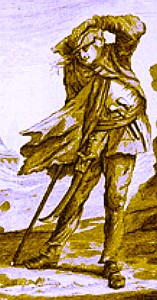
Artist: Joseph Nicholls
Edward Low, From The General
History of the Pirates (1736)
too many men up the masts, resulting in the vessel tipping over. When this happened.
Low and the Doctor were in the Cabin together, and as soon as he [Low] perceived the Water to gush in upon him, he bolted out at one of the Stern-Ports, which the Doctor also attempted, but the Sea rushed so violently into the Port by that time, as to force him back into the Cabin, upon which Low nimbly run his Arm into the Port, and caught hold of his Shoulder and drew him out, and so saved him.12
Low clearly felt that the surgeon was worth saving, which makes the next story, perhaps one of the most notable mentions of a pirate surgeon at work, all the more surprising. Low had been accidentally wounded by one of his men
which laid the Teeth bare; upon this the Surgeon was called, who immediately stitched up the Wound, but Low finding fault with the Operation; the Surgeon being tollerably drunk, as it was customary for every Body to be, struck Low such a Blow with his Fist, that broke out all the Stitches, and then bid him sew up his Chops himself and be damned, so that Low made a very pitiful Figure for some Time after.13
Historian Graham notes that Kencate "was later transferred onto the prize Rebecca which Low had given to his newest recruit, the first mate [Charles] Harris, as a consort to [Low's ship] the Fancy."14 It is possible that this was done to get Kencate off Low's ship so that he wouldn't have to deal with this surgeon.
It is interesting that Kencate is identified as being drunk in the above episode. Kencate's penchant for drink is mentioned by witness Benjamin Wickham as well. Wickham deposed that after his ship had been captured, "there came a Man on board the Vessel whom they called the Doctor, who drank and was
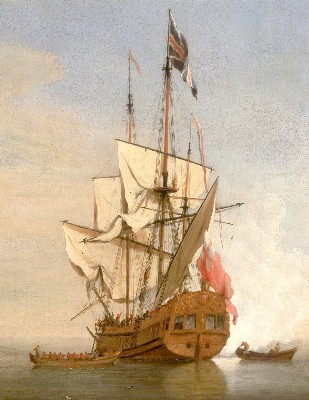
Artist: Willem van de Velde the Younger
English Sixth Rate Man-of-War (1706)
merry with some of the Pyrates then there, and told him the Deponent he would send him something to take [possibly referring to medicine] but sent it not."15 This provides an interesting contrast with some of the other testimony which said Kencate spent a lot of his time reading and that "he [Kencate] seem'd not to rejoyce when he [deponent John Welland] was taken but solitary"16. Of course, it is possible that these various incidents refer to someone other than Kencate.
The ship Kencate was aboard was taken by the sixth rate HMS Greyhound Man-of-War in June of 1723. After the battle, Kencate and his medical supplies were brought to the Greyhound's surgeon, Archibald Fisher. Fisher "searched his [Kencate's] Medicaments [medicines], and the Instruments, and found but very few Medicaments, and the Instruments very mean and bad."17
This suggests that either Kencate didn't take very good care of his equipment or he didn't have access to good equipment. Unlike trials of other pirate surgeons, there is no mention of Kencate pillaging the medical kits or surgeon's chests of captured prize ships. It seems unlikely that none of Low's prize ships would have had surgical chests, since even those without surgeons typically had a medicine chest of some sort in the captain's cabin. So it is quite possible that Kencate wasn't active in raiding the medical supplies of the pirate's prizes. If it had come out at trial, this would actually have worked in his favor.
Following the Kencate's trial, "the Court Examined and Considered the Evidences and Pleas for the King, and the Prisoners Case, with great Care, and by an Unanimous Voice found the said John Kencate Doctor, Not Guilty."18
1 “Tryals of Thirty Six Persons for PIRACY", 1723, British Piracy in the Golden Age, Vol. 3, 2007, p. 174; 2 “Tryals of Thirty Six Persons...", p. 173; 3 Daniel Defoe (Captain Charles Johnson), A General History of the Pyrates, Manuel Schonhorn, ed., 1999, p. 331; 4 Defoe (Captain Charles Johnson), p. 329; 5 Weekly Journal or Saturdays Post, 8-31-23, Issue 253; 6 For examples, see editor Manuel Schonhorn's "Commentary and Notes" found in Defoe (Captain Charles Johnson), pp. 663-95; 7 “Tryals of Thirty Six Persons...", p. 184; 8 Eric J. Graham, Seawolves: Pirates & the Scots, 2005, p. 109; 9 “Tryals of Thirty Six Persons...", p. 183; 10 “Tryals of Thirty Six Persons...", p. 184; 11 “Tryals of Thirty Six Persons...", p. 188-9; 12 Philip Ashton, Ashton’s Memorial, 1726, p. 29; 13 Captain Charles Johnson, A general history of the pirates, 2nd Edition, 1724, p. 374; 14 Graham, p. 110; 15,16,17,18 “Tryals of Thirty Six Persons...", p. 184

